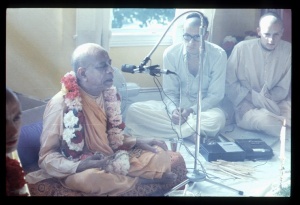SB 3.20.13: Difference between revisions
m (1 revision(s)) |
No edit summary |
||
| Line 1: | Line 1: | ||
{{info | {{info | ||
|speaker=Maitreya | |speaker=Maitreya Ṛṣi | ||
|listener=Vidura | |listener=Vidura | ||
}} | }} | ||
[[Category:Srimad-Bhagavatam - Canto 03 Chapter 20]] | |||
[[Category:Bhagavatam Verses Spoken by Maitreya Rsi - Vanisource|032013]] | |||
<div style="float:left">'''[[Srimad-Bhagavatam]] - [[SB 3|Third Canto]] - [[SB 3.20: Conversation Between Maitreya and Vidura|Chapter 20: Conversation Between Maitreya and Vidura]]'''</div> | |||
<div style="float:right">[[File:Go-previous.png|link=SB 3.20.12]] '''[[SB 3.20.12]] - [[SB 3.20.14]]''' [[File:Go-next.png|link=SB 3.20.14]]</div> | |||
{{RandomImage}} | |||
==== TEXT 13 ==== | ==== TEXT 13 ==== | ||
<div | <div class="verse"> | ||
rajaḥ-pradhānān mahatas | :rajaḥ-pradhānān mahatas | ||
tri-liṅgo daiva-coditāt | :tri-liṅgo daiva-coditāt | ||
jātaḥ sasarja bhūtādir | :jātaḥ sasarja bhūtādir | ||
viyad-ādīni pañcaśaḥ | :viyad-ādīni pañcaśaḥ | ||
</div> | </div> | ||
| Line 16: | Line 22: | ||
==== SYNONYMS ==== | ==== SYNONYMS ==== | ||
<div | <div class="synonyms"> | ||
rajaḥ- | ''rajaḥ-pradhānāt''—in which the element of ''rajas'', or passion, predominates; ''mahataḥ''—from the ''mahat-tattva''; ''tri-liṅgaḥ''—of three kinds; ''daiva-coditāt''—impelled by superior authority; ''jātaḥ''—was born; ''sasarja''—evolved; ''bhūta-ādiḥ''—the false ego (origin of the material elements); ''viyat''—the ether; ''ādīni''—beginning with; ''pañcaśaḥ''—in groups of five. | ||
</div> | </div> | ||
| Line 23: | Line 29: | ||
==== TRANSLATION ==== | ==== TRANSLATION ==== | ||
<div | <div class="translation"> | ||
As impelled by the destiny of the jīva, the false ego, which is of three kinds, evolved from the mahat-tattva, in which the element of rajas predominates. From the ego, in turn, evolved many groups of five principles. | As impelled by the destiny of the jīva, the false ego, which is of three kinds, evolved from the mahat-tattva, in which the element of rajas predominates. From the ego, in turn, evolved many groups of five principles. | ||
</div> | </div> | ||
| Line 30: | Line 36: | ||
==== PURPORT ==== | ==== PURPORT ==== | ||
<div | <div class="purport"> | ||
The primordial matter, or prakṛti, material nature, consisting of three modes, generates four groups of five. The first group is called elementary and consists of earth, water, fire, air and ether. The second group of five is called tan-mātra, referring to the subtle elements (sense objects): sound, touch, form, taste and smell. The third group is the five sense organs for acquiring knowledge: eyes, ears, nose, tongue and skin. The fourth group is the five working senses: speech, hands, feet, anus and genitals. Some say that there are five groups of five. One group is the sense objects, one is the five elements, one is the five sense organs for acquiring knowledge, another is the senses for working, and the fifth group is the five deities who control these divisions. | The primordial matter, or ''prakṛti'', material nature, consisting of three modes, generates four groups of five. The first group is called elementary and consists of earth, water, fire, air and ether. The second group of five is called ''tan-mātra'', referring to the subtle elements (sense objects): sound, touch, form, taste and smell. The third group is the five sense organs for acquiring knowledge: eyes, ears, nose, tongue and skin. The fourth group is the five working senses: speech, hands, feet, anus and genitals. Some say that there are five groups of five. One group is the sense objects, one is the five elements, one is the five sense organs for acquiring knowledge, another is the senses for working, and the fifth group is the five deities who control these divisions. | ||
</div> | </div> | ||
__NOTOC__ | |||
<div style="float:right; clear:both;">[[File:Go-previous.png|link=SB 3.20.12]] '''[[SB 3.20.12]] - [[SB 3.20.14]]''' [[File:Go-next.png|link=SB 3.20.14]]</div> | |||
__NOTOC__ | |||
__NOEDITSECTION__ | |||
Revision as of 10:49, 6 May 2021

A.C. Bhaktivedanta Swami Prabhupada
TEXT 13
- rajaḥ-pradhānān mahatas
- tri-liṅgo daiva-coditāt
- jātaḥ sasarja bhūtādir
- viyad-ādīni pañcaśaḥ
SYNONYMS
rajaḥ-pradhānāt—in which the element of rajas, or passion, predominates; mahataḥ—from the mahat-tattva; tri-liṅgaḥ—of three kinds; daiva-coditāt—impelled by superior authority; jātaḥ—was born; sasarja—evolved; bhūta-ādiḥ—the false ego (origin of the material elements); viyat—the ether; ādīni—beginning with; pañcaśaḥ—in groups of five.
TRANSLATION
As impelled by the destiny of the jīva, the false ego, which is of three kinds, evolved from the mahat-tattva, in which the element of rajas predominates. From the ego, in turn, evolved many groups of five principles.
PURPORT
The primordial matter, or prakṛti, material nature, consisting of three modes, generates four groups of five. The first group is called elementary and consists of earth, water, fire, air and ether. The second group of five is called tan-mātra, referring to the subtle elements (sense objects): sound, touch, form, taste and smell. The third group is the five sense organs for acquiring knowledge: eyes, ears, nose, tongue and skin. The fourth group is the five working senses: speech, hands, feet, anus and genitals. Some say that there are five groups of five. One group is the sense objects, one is the five elements, one is the five sense organs for acquiring knowledge, another is the senses for working, and the fifth group is the five deities who control these divisions.